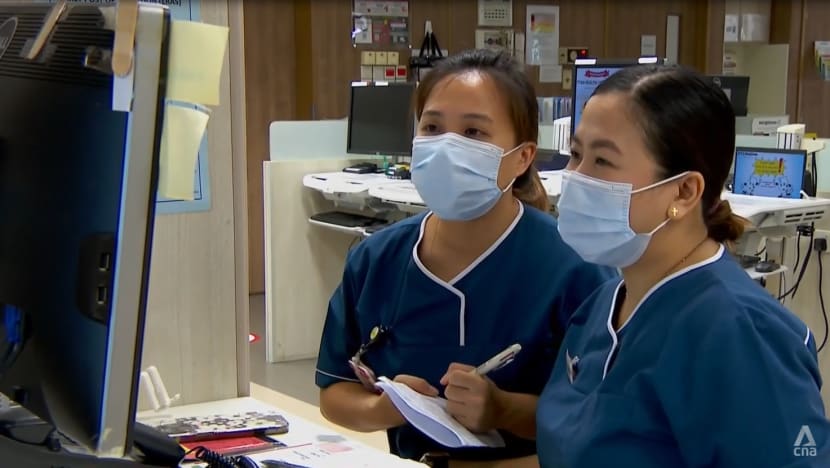Amid manpower crunch, Tan Tock Seng Hospital to offer flexi-shifts to 2,500 nurses by end-2024
The hospital began trialling its “liquid nursing” initiative in October 2023, after nurses gave feedback on a lack of flexibility and finishing work past their official shift end time.

Tan Tock Seng Hospital senior staff nurse Manjares Melody Biag (R) working with a colleague.

This audio is generated by an AI tool.
SINGAPORE: When Ms Manjares Melody Biag returned to work from maternity leave eight months ago, she opted for a work arrangement that was novel in healthcare: Flexi-shifts.
“(It) benefits me a lot because I need to take care of my baby in the daytime, and it allows me to not miss out on any of his milestones,” said the senior staff nurse from Tan Tock Seng Hospital (TTSH).
Ms Manjares was part of the hospital’s “liquid nursing” initiative, which was trialled since October last year with more than 200 nurses.
On Thursday (May 9), TTSH announced that it will expand the programme to 2,500 nurses working in 27 inpatient subsidised wards by the end of this year.
There are plans to eventually roll it out for all 4,000 nurses across the hospital, including in the intensive care ward.
This comes as the nursing sector, notorious for long hours and shift work, struggles with a perpetual manpower crunch. TTSH said it hopes to give its nurses more flexibility to plan their work and balance their life through flexible rosters.
It is the latest effort by local healthcare institutions to reduce staff attrition.
Last year, Gleneagles Hospital chartered shuttle buses between Singapore and Johor for staff who live in Malaysia to get them to stay in the job.
In February, the Ministry of Health announced a long-term retention scheme where nurses will receive up to S$100,000 (US$74,000) over the next 20 years of their career, with payouts every four to six years. It is set to benefit about 29,000 nurses in the public healthcare system.
NINE ROUTINE, FLEXIBLE SHIFTS TO CHOOSE FROM
Under TTSH’s liquid nursing programme, full-time nurses will have nine shifts to choose from. This is up from three routine shifts a day previously – two eight-hour shifts in the morning and afternoon, and one 12-hour shift at night.
Now, they can have a mix of routine and flexible shifts each month – as long as they fulfil the 80-work-hour requirement every two weeks.
The six flexible shifts range from four hours to 12 hours long, with varying start and finish times.
For example, a nurse can choose to work six hours from 2pm to 8pm, or nine hours from 10am to 7pm. The four-hour shift comes with flexible timing.
Under the initiative, nurses on flexible shifts are called flexi-nurses. They support principal nurses – those on routine shifts with full duty of care – by helping with complex bedside procedures like wound dressings. They also provide other forms of support like caregiver training and transporting patients.
SURVEY SHOWED STAFF MORALE WENT UP
The initiative has saved principal nurses about 30 to 90 minutes daily, allowing them to have sufficient break times and focus better on their key tasks, said the hospital in a press release.
After the trial, which took two months from October 2023 to January 2024, TTSH conducted a survey among participating nurses that showed improvements in staff morale.
Almost all of the nurses reported that they were able to get enough rest during a shift, up from 54 per cent. Nine in 10 welcomed their new work arrangements.
The number of nurses who were able to leave work on time for most or all of their shifts also more than doubled, from less than 30 per cent to 70 per cent.
TTSH has also revised its shift handover process, allowing nurses to save two-and-a-half hours per shift thanks to digitisation.
Another major challenge is shift rostering, which is currently done manually. TTSH is working with the Singapore Management University to build an artificial intelligence-supported software that can do such scheduling.
FOCUS GROUP DISCUSSIONS HELD
TTSH noted the challenges in accommodating flexi-work arrangements in nursing, given that it is location- and time-specific.
Before deciding to pilot the liquid nursing programme, TTSH held focus group discussions with its nurses.
They spoke about a lack of flexibility in shift start and end times, as well as shift duration. Nurses also finished work past their official shift end time, due to activities like handover sessions.
The hospital also conducted a “time-motion study” in one of its smart wards for advancing workplace innovations. The study aimed to capture what ward nurses do during their three shifts over a 24-hour workday.
“The study shed light on the peak time periods where patient care needs are the highest and nursing time is most needed. Hence, care activities can be modularised and reassigned to nurses working flexible shift hours,” TTSH said in its press release.
The two-month trial for the liquid nursing programme then began in one ward with 52 nurses. It expanded to three wards by the end of the trial.
Dr Hoi Shu Yin, chief nurse at TTSH, said the hospital began offering flexi-shifts with the intent to promote wellbeing and give nurses the support they need to fulfil their professional and personal aspirations.
She pointed out that some TTSH nurses are mothers like Ms Manjares. Through the programme, they can better organise their time and send their children to childcare.
“Since we started the initiative, we find that there's greater satisfaction and work because the work schedule is better able to meet their needs,” Dr Hoi added.



















